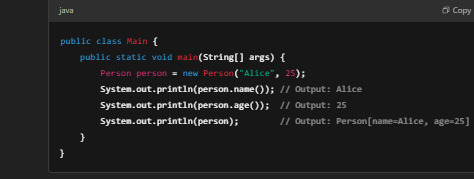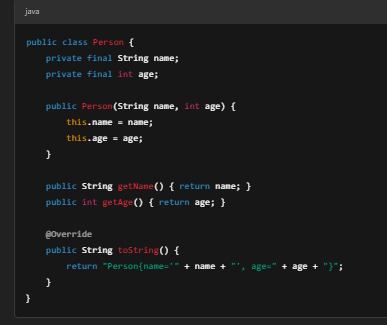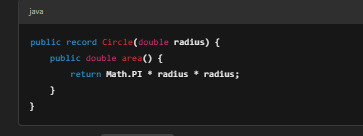#Constructor in Java
Explore tagged Tumblr posts
Text
Encapsulation in Java – A Complete Guide
Learn everything about Encapsulation in Java with Scientech Easy's beginner-friendly guide. Understand how encapsulation helps in data hiding, improves code maintainability, and secures your Java applications. This comprehensive article covers its real-world use, syntax, and practical examples to help you grasp the concept easily. Perfect for students and developers looking to strengthen their OOP fundamentals.Scientech Easy for clear explanations and step-by-step learning on Java programming topics. Start mastering encapsulation today!

#bca course subjects#python tuple#Interface in Java#Encapsulation in Java#Method overriding in Java#Polymorphism in Java#Constructor in java
0 notes
Text

What are autoboxing and unboxing? . . . . For more questions about Java https://bit.ly/3kw8py6 Check the above link
#wrapperclass#boxing#unboxing#objectcloning#serialization#externalizable#IOstream#finalize#runtimeclass#anonymousinnerclass#localinnerclass#memberinnerclass#interface#garbagecollector#polymorphism#java#constructor#thiskeyword#computersciencemajor#javatpoint
2 notes
·
View notes
Text
i have been vaguely considering making a minecraft mod, but every time i think about the specifics of it i remember how intensely java-brained forge was back in the days and i'm like "how likely is it that any of the 4 competing modloaders have actually made themselves less java brained in the past uhhh seven years" and i don't really want to dig in
also b/c i'm using an outdated version of ubuntu i'd have to do a complete system reinstall to get access to apt back and be able to set up a java development environment
(when i say 'java brained' the specific thing i'm thinking of was to register blocks you had to provide a class for it to autoinstance. you could not provide, you know, an object that was an instance of the block-provididing class, you had to make a singleton class. just the classic java thing of instead of having classes with parameters which you create specific instances of, you have classes that have derived classes that are only ever expected to be instanced with a blank constructor b/c all the specific object data is in the class definition instead of being able to be specified on the object level. the classic 'we don't have first-class functions so it's impossible to vary a function callback' java thing, & it was enshrined into forgemodloader at the most basic level.)
8 notes
·
View notes
Text
I decided to take part in the 100 days of code challenge!
Day 1/100 ✧˖*°࿐
Learnt java concepts like methods, invoking methods, constructors and some more.

26 notes
·
View notes
Text
I was a Java noob
At one time, every user was a newbie. Facebook recently reminded me of something I wrote 11 years ago today, when I was learning Java:
I'm still trying to wrap my mind around the notion that Java (apparently) implements write-once semantics for references and primitive types but lacks read-only semantics for methods or objects. I'm also wishing Java collections provided a copy constructor for iterators. Despite these flaws, its advantages over C++ are stark.
Looking back, here are my reactions:
In Java, the natural way to implement read-only semantics for methods and objects is to define a read-only interface. This is what the JOML library does, for instance. For each mutable class (Matrix4f, Quaternionf, Vector3d) it defines an interface (Matrix4fc, Quaternionfc, Vector3dc) with read-only semantics. I wish I'd known that trick in 2012.
Some of Java's advantages are historical. Gosling in 1995 foresaw the importance of threads and URLs, so he built them into the language. Stoustrup in 1982 did not foresee their importance. (Believe it or not, URLs weren't invented until 1994!)
Some of Java's advantages are because it didn't try as hard to maintain compatibility with C. For instance, Stoustrup was doubtless aware of the portability headaches in C, such as "int" having different limits on different architectures, but it seemed more important to be able to re-use existing C code in C++ than to fix fundamental flaws in the language.
Not sure why I wanted a copy constructor for iterators. Nowadays I rarely use iterators directly, thanks to the "enhanced for loop" added in Java SE 5. That feature was 8 years old when I learned Java. Not sure why I wasn't using it.
I love Java even more than I did in 2012. Nowadays I dread working in C/C++
#programming languages#java#computing history#c++ language#c++#facebook#software development#newbie#coding
4 notes
·
View notes
Text
Throwing an Error exception in Java
Question
What kind of exception is the Error exception? I'm also curious about inheriting it.
Answer
First, Error doesn't inherit from the RuntimeException class. Therefore, one can't call it a runtime exception. Nevertheless, it can be called an unchecked exception. Of course, it's not a checked exception.
As for inheriting it, one can create another Error. It's meant to be for unrecoverable errors like a thread death. One can't possibly bring a thread back to life.
Java 1.7 brought yet another constructor for this particular class. One can disable suppressing exceptions and thus any effect of the 'addSuppressed()' method. One can also disable filling in the execution stack trace, which means an error can come without a stack trace written in it.
0 notes
Text
10 Must-Know Java Libraries for Developers
Java remains one of the most powerful and versatile programming languages in the world. Whether you are just starting your journey with Java or already a seasoned developer, mastering essential libraries can significantly improve your coding efficiency, application performance, and overall development experience. If you are considering Java as a career, knowing the right libraries can set you apart in interviews and real-world projects. In this blog we will explore 10 must-know Java libraries that every developer should have in their toolkit.

1. Apache Commons
Apache Commons is like a Swiss Army knife for Java developers. It provides reusable open-source Java software components covering everything from string manipulation to configuration management. Instead of reinventing the wheel, you can simply tap into the reliable utilities offered here.
2. Google Guava
Developed by Google engineers, Guava offers a wide range of core libraries that include collections, caching, primitives support, concurrency libraries, common annotations, string processing, and much more. If you're aiming for clean, efficient, and high-performing code, Guava is a must.
3. Jackson
Working with JSON data is unavoidable today, and Jackson is the go-to library for processing JSON in Java. It’s fast, flexible, and a breeze to integrate into projects. Whether it's parsing JSON or mapping it to Java objects, Jackson gets the job done smoothly.
4. SLF4J and Logback
Logging is a critical part of any application, and SLF4J (Simple Logging Facade for Java) combined with Logback offers a powerful logging framework. SLF4J provides a simple abstraction for various logging frameworks, and Logback is its reliable, fast, and flexible implementation.
5. Hibernate ORM
Handling database operations becomes effortless with Hibernate ORM. It maps Java classes to database tables, eliminating the need for complex JDBC code. For anyone aiming to master backend development, getting hands-on experience with Hibernate is crucial.
6. JUnit
Testing your code ensures fewer bugs and higher quality products. JUnit is the leading unit testing framework for Java developers. Writing and running repeatable tests is simple, making it an essential part of the development workflow for any serious developer.
7. Mockito
Mockito helps you create mock objects for unit tests. It’s incredibly useful when you want to test classes in isolation without dealing with external dependencies. If you're committed to writing clean and reliable code, Mockito should definitely be in your toolbox.
8. Apache Maven
Managing project dependencies manually can quickly become a nightmare. Apache Maven simplifies the build process, dependency management, and project configuration. Learning Maven is often part of the curriculum in the best Java training programs because it’s such an essential skill for developers.
9. Spring Framework
The Spring Framework is practically a requirement for modern Java developers. It supports dependency injection, aspect-oriented programming, and offers comprehensive infrastructure support for developing Java applications. If you’re planning to enroll in the best Java course, Spring is something you’ll definitely want to master.
10. Lombok
Lombok is a clever little library that reduces boilerplate code in Java classes by automatically generating getters, setters, constructors, and more using annotations. This means your code stays neat, clean, and easy to read.
Conclusion
Choosing Java as a career is a smart move given the constant demand for skilled developers across industries. But mastering the language alone isn't enough—you need to get comfortable with the libraries that real-world projects rely on. If you are serious about becoming a proficient developer, make sure you invest in the best Java training that covers not only core concepts but also practical usage of these critical libraries. Look for the best Java course that blends hands-on projects, mentorship, and real-world coding practices. With the right skills and the right tools in your toolkit, you'll be well on your way to building powerful, efficient, and modern Java applications—and securing a bright future in this rewarding career path.
0 notes
Text
ECE 39595 HW4
Use the code in directory userid. I have given you the skeletons for all classes that you need to implement. Comments in the code provide suggestions as to how to implement the functions. You should implement all necessary constructors. The code in HW4.java should not be changed, and this code should be used as your main function. Comparable is a base class that allows two objects that derive…
0 notes
Text
Master Polymorphism in Java – Scientech Easy
Dive into Polymorphism in Java with easy-to-follow guides at Scientech Easy. Learn how Java supports method overloading and overriding, enabling flexible and dynamic behavior in your programs. Perfect for enhancing your OOP skills!

#constructor in java#collection framework in java#Exception handling in Java#inheritance in java#Interface in Java#Python tuple#bca course subjects
0 notes
Text

What is the difference between ArrayList and Vector? . . . . For more questions about Java https://bit.ly/3Lcw553 Check the above link
#collectionframework#array#ArrayList#Vector#collection#process#heavyweightcomponent#reflection#Classclass#Systemclass#wrapperclass#boxing#unboxing#objectcloning#serialization#polymorphism#java#constructor#thiskeyword#computersciencemajor#javatpoint
0 notes
Text
at various times I have thought and/or it's been suggested to me that my conversations with my dad should be recorded and put out as a weird podcast
I don't think that necessarily applies to "an experienced javascript programmer who never writes object oriented code and an experienced java/vb programmer with familiarity with c and python discover how javascript classes work" because the audience would be. uh. small. and the quality would be bad
I bet "what are the pros and cons of the constructor keyword being 'constructor' vs being the name of the class, from a conceptual standpoint" is a topic that has been discussed on multiple real podcasts though.
0 notes
Text
Java Constructors: A Beginner’s Guide with Real-World Examples

Java constructors are unique techniques for initializing objects. By establishing initial values and guaranteeing correct object formation, they are essential to object-oriented programming. This tutorial will cover the many kinds of Java constructors, such as parameterized, copied, and default constructors, along with real-world Java examples to help you grasp their usefulness.
0 notes
Text
Exploring Record Classes in Java: The Future of Immutable Data Structures
A record in Java is a special type of class designed specifically for holding immutable data. Introduced in Java 14 as a preview feature and made stable in Java 16, records eliminate the need for writing repetitive boilerplate code while still providing all the essential functionalities of a data model.
Key Characteristics of Java Records
Immutable by Default – Once created, the fields of a record cannot be modified.
Automatic Methods – Java automatically generates equals(), hashCode(), and toString() methods.
Compact Syntax – No need for explicit constructors and getters.
Final Fields – Fields inside a record are implicitly final, meaning they cannot be reassigned.
How to Define a Record Class in Java
Defining a record class is straightforward. You simply declare it using the record keyword instead of class.
Example: Creating a Simple Record
java

Using the Record Class
java

Notice how we access fields using methods like name() and age() instead of traditional getter methods (getName() and getAge()).
Comparing Records vs. Traditional Java Classes
Before records, we had to manually write constructors, getters, setters, and toString() methods for simple data structures.
Traditional Java Class (Without Records)
java

This approach requires extra lines of code and can become even more verbose when dealing with multiple fields.
With records, all of this is reduced to just one line:
java

When to Use Records?
Records are ideal for: ✔ DTOs (Data Transfer Objects) ✔ Immutable Data Representations ✔ Returning Multiple Values from a Method ✔ Reducing Boilerplate Code in Simple Models
Customizing Records: Adding Methods and Static Fields
Though records are immutable, you can still add methods and static fields for additional functionality.
Example: Adding a Custom Method
java

Now you can call circle.area() to calculate the area of a circle.
Using Static Fields in Records
java

Limitations of Java Record Classes
While records are powerful, they do have some limitations: ❌ Cannot Extend Other Classes – Records implicitly extend java.lang.Record, so they cannot inherit from any other class. ❌ Immutable Fields – Fields are final, meaning you cannot modify them after initialization. ❌ Not Suitable for Complex Objects – If your object has behavior (methods that modify state), a traditional class is better.
Conclusion: Are Java Record Classes the Future?
Record classes offer a modern, efficient, and elegant way to work with immutable data structures in Java. By removing repetitive boilerplate code, they improve code readability and maintainability.
If you’re working with data-heavy applications, DTOs, or immutable objects, adopting records is a great way to simplify your Java code while ensuring efficiency.
What’s your experience with Java records? Share your thoughts in the comments! 🚀
FAQs
1. Can I modify fields in a Java record?
No, records are immutable, meaning all fields are final and cannot be changed after object creation.
2. Are Java records faster than regular classes?
Performance-wise, records are similar to normal classes but offer better readability and maintainability due to their compact syntax.
3. Can a record extend another class?
No, records cannot extend any other class as they already extend java.lang.Record. However, they can implement interfaces.
4. How are records different from Lombok’s @Data annotation?
While Lombok’s @Data generates similar boilerplate-free code, it requires an external library. Java records, on the other hand, are built into the language.
5. What Java version supports records?
Records were introduced as a preview feature in Java 14 and became a stable feature in Java 16. For more Info : DevOps with Multi Cloud Training in KPHB
#Java#CoreJava#JavaProgramming#JavaDeveloper#LearnJava#Coding#Programming#Tech#SoftwareDevelopment#ImmutableObjects#JavaRecords#OOP#CleanCode#CodeNewbie#DevLife#BackendDevelopment#Java21#TechBlog#CodeWithMe#100DaysOfCode#CodeSnippet#ProgrammingTips#TechTrends
0 notes
Text
Learn how to use ImageIcon Class Java to display and manipulate images in Swing applications. This tutorial covers constructors, methods, and practical examples.
1 note
·
View note
Text
Why Kotlin is the Best Choice for Android App Development in 2025

As Android app development continues to evolve, developers and businesses are constantly seeking better ways to streamline the process and enhance the performance of their applications. Since its introduction, Kotlin has become the preferred programming language for Android development, surpassing Java in popularity. By 2025, Kotlin is expected to be even more ingrained in the Android development ecosystem, offering even more features and improvements. For businesses looking to create robust, scalable, and high-performance Android apps, partnering with a Kotlin App Development Company is a wise decision to ensure success. In this blog, we’ll explore why Kotlin is the best choice for Android app development in 2025 and why it’s crucial for companies to embrace it for their mobile app projects.
1. Kotlin’s Official Support by Google
Kotlin’s rise to prominence in Android development can largely be attributed to its official endorsement by Google. In 2017, Google announced Kotlin as a first-class language for Android development, making it the language of choice for developers. Since then, the Android development community has widely adopted Kotlin due to its modern features, which are specifically designed to make coding easier and more efficient.
By 2025, Kotlin is expected to continue dominating the Android landscape, as it remains Google’s recommended language for Android app development. The Kotlin team has actively maintained and improved the language, ensuring it stays ahead of the curve with new features and optimizations that are well-suited for building Android applications.
2. Concise and Readable Code
One of the main advantages of Kotlin over Java is its concise syntax. Kotlin reduces boilerplate code, allowing developers to write more efficient code with fewer lines. This not only makes development faster but also enhances code readability, making it easier for developers to maintain and debug applications.
Kotlin’s features, such as data classes, smart casts, and default arguments, make common tasks simpler. For example, in Java, creating a simple data class requires multiple lines of code for getters, setters, and constructors. In Kotlin, a data class can be written in just a single line, significantly improving the efficiency of the development process.
In 2025, as app development becomes more complex, Kotlin's concise syntax will continue to save developers time and effort, making it the best choice for projects that demand clean and maintainable code.
3. Interoperability with Java
Another reason why Kotlin remains the best choice for Android app development is its full interoperability with Java. Kotlin was designed to be fully compatible with Java, meaning that developers can use Kotlin in existing Java-based Android projects without having to rewrite the entire codebase.
For businesses that already have Android apps built with Java, migrating to Kotlin is a seamless process. You can incrementally convert Java code to Kotlin, which means you don’t need to overhaul your entire project to take advantage of Kotlin’s modern features. This ability to work with both Kotlin and Java allows developers to leverage the best of both worlds, making Kotlin a flexible and future-proof language for Android development.
4. Enhanced Performance
Performance is a critical factor when building any mobile app, and Kotlin is designed to offer better performance than Java. Kotlin’s concise code structure and optimizations ensure that applications run smoothly and efficiently, offering users a better experience. In addition, Kotlin is a statically-typed language, which allows for compile-time checks, reducing the chance of runtime errors and enhancing the stability of the app.
In 2025, as apps become more resource-intensive and performance demands increase, Kotlin’s ability to generate optimized bytecode will ensure that Android apps continue to perform at their best. The language's efficiency makes it ideal for building apps that require fast processing speeds, like gaming apps, real-time communication apps, and apps that handle large datasets.
5. Strong Community Support and Libraries
Kotlin has built a strong community since its adoption by Google, and its developer ecosystem is thriving. Developers can access an extensive library of open-source tools, frameworks, and resources to enhance their Android apps. The Kotlin community is highly active, with numerous tutorials, documentation, and forums to help developers solve problems and improve their skills.
Additionally, Kotlin’s seamless integration with popular Android libraries and frameworks ensures that developers can quickly implement essential features such as user authentication, network communication, and data storage. Kotlin’s integration with Android Studio, the official Integrated Development Environment (IDE) for Android development, makes it even more convenient for developers to write, test, and deploy Kotlin-based apps.
6. Kotlin’s Role in Reducing Development Costs
Another reason to choose Kotlin for Android development in 2025 is its potential to reduce overall development costs. As Kotlin is more concise and easier to maintain than Java, developers can write high-quality apps in less time, which reduces labor costs. Additionally, Kotlin’s compatibility with Java means that businesses don’t need to completely rewrite their existing apps, saving on migration and refactoring costs.
By integrating Kotlin into your Android app development workflow, you also benefit from fewer bugs and issues in production, which ultimately saves on maintenance costs. When using a mobile app cost calculator to estimate your project, it’s clear that Kotlin's benefits in terms of development efficiency and reduced maintenance contribute to a more cost-effective app development process.
If you're interested in exploring the benefits Kotlin app development services for your business, we encourage you to book an appointment with our team of experts. Book an Appointment
7. Increased Developer Productivity
Kotlin is designed to boost developer productivity with features such as null safety, extension functions, and coroutine support. These features eliminate many of the common issues that developers face with Java, such as null pointer exceptions, and streamline common tasks like background threading and asynchronous programming.
Kotlin’s null safety ensures that developers avoid common errors where a variable may be null, reducing the likelihood of crashes. Meanwhile, Kotlin’s coroutines provide a powerful tool for handling asynchronous tasks, such as network requests and database queries, without complicating the code.
As app development becomes more time-sensitive and competitive in 2025, Kotlin’s productivity-enhancing features will continue to help developers build Android apps faster and more efficiently.
8. The Future of Kotlin in Android App Development
As Android development moves forward, Kotlin’s role will continue to grow. With ongoing improvements and innovations, Kotlin is expected to evolve alongside Android’s own advancements. In 2025, Kotlin will likely integrate even more features designed to make Android app development faster, more reliable, and more scalable.
For businesses looking to stay ahead in the mobile app space, working with a Kotlin App Development Company ensures that they are using the most modern and efficient tools available. By leveraging Kotlin’s full potential, companies can build high-quality, future-proof Android apps that meet the needs of their users and deliver outstanding user experiences.
Conclusion
Kotlin is undoubtedly the best choice for Android app development in 2025, offering a combination of simplicity, performance, and flexibility that Java simply can’t match. From its official support by Google to its concise syntax and robust performance, Kotlin has proven to be an ideal language for creating modern Android apps.
For businesses looking to build Android apps that are efficient, scalable, and cost-effective, choosing Kotlin is a no-brainer. With the help of Kotlin App Development Services, your company can ensure a smooth and successful app development process. Don’t wait—embrace Kotlin today to take your Android app to the next level!
0 notes
Text
JAC – 444 Workshop 3 The following workshop lets you practice basic java coding techniques, creating classes, methods, using arrays, inheritance
The following workshop lets you practice basic java coding techniques, creating classes, methods, using arrays, inheritance, polymorphism, Exceptional Handling. Task – 1: Design an abstract class named GeometricObject that contains: • A private String data field named color (default value “white”) • A private Boolean data field named filled. • A no-arg constructor. • A protected overloaded…
0 notes